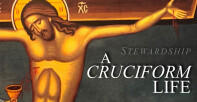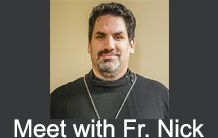Handing Over the Spirit
There was a man—so the parable goes—who was going on a journey. This man summons his servants and hands over to them that which was his own. He gives to them different amounts according to the capability of each servant. Two of the three servants immediately put what was given to them to work. But one servant buries what he was given. He hides it away. He does nothing with it.
The man returns. The servants bring the fruits of their labors and present them to their master. The two servants who worked with what they were handed had produced more, and were given even more by their master in return. The one who did nothing gave back what he had been handed and nothing more. He was a servant who had not worked with what he had been given. He was thrown out as useless.
This is, of course, the story of Christ. St. John retells this parable when he relates the Passion of the Christ. Jesus tells his servants—His disciples—that He is both going away and that He is coming to them (14:28). Pilate identifies Jesus as “the Man” when he dressed Jesus for His journey (19:5). And as He departs, Jesus hands over that which is His own; He handed over His Spirit.
On the cross He speaks the word: “It is finished.” The work of the creation of man—which began with the words, “Let us make man in our own image”—has now been completed on this sixth day. So this second Adam inclines His head, hands over His Spirit (19:30), and enters into His seventh day Sabbath rest. The first man—Adam—had the breath of life breathed into his nostrils. The final man—Christ—has the life-producing Spirit come from his nostrils as He dies. (cf. 1 Cor. 15:45)
St. John then records that, when a soldier pierced the side of Christ’s dead body, blood and water came forth (19:34). As Eve came from the side of the sleeping Adam, so the Church comes from the side of the sleeping Christ. "Eve" is the Hebrew word for life. The Church’s cruciform life that comes from the crucified Christ is Spirit, water, and blood. Just as the physical breath, water, and blood sustain the physical life of every human being that comes from Adam and is born through Eve, so the Holy Spirit, baptismal water, and martyric blood sustain eternal life for every authentic human being that comes from Christ and is born through the Church.
True Christian stewardship is the management of what has been given to us in the Church. It is not primarily time, talents, and treasures which has been handed over to us. Those things have been given to every living person in this world and the rest of the world will have to answer to God about how they used them. But to us--His servants in His Church--He has given something far greater to put to work. He has given us His life-creating Spirit. It is a martyric Spirit. The choice about what we will do with His Spirit is ours every day that we wake up breathing. We can chose to bury that Spirit and hide it so that we can continue to indulge ourselves, preserve ourselves, and govern over our own little kingdom. Or, we can choose to put His Spirit to work in our lives by denying ourselves, sacrificing ourselves, and submitting ourselves to His Kingdom.








Comments
Login/Register to leave a comment